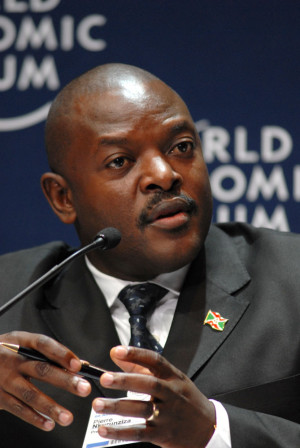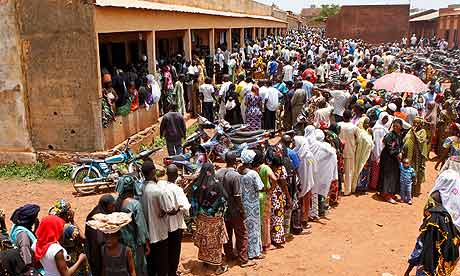The African continent has seen more than its fair share of leaders who have overstayed their welcome. As free and fair elections have occurred more frequently and respect for the democratic process has started to take hold, several African countries have witnessed peaceful transitions of power. Despite this promising trend, there are still too many countries burdened by the resistance of elected leaders to leaving office. In Burundi, this familiar scenario has triggered an increasingly violent conflict.
On April 25, 2015, heated protests erupted as President Pierre Nkurunziza (pictured) announced that he was seeking a third term in office in elections set to take place this June. Nkurunziza, a former Hutu militia leader who was appointed by the Burundian parliament in 2005, was cleared to declare his candidacy by a constitutional court on the technicality that his first term as appointed president did not count. Since Nkurunziza declared his candidacy three weeks ago, 19 people have been killed in protests and over 50,000 have fled to neighbouring countries. Against this backdrop of increasing violence, major world leaders have called for a postponement of the elections. Tensions mounted further this past Wednesday, when Major General Godefroid Niyombare, a former ally of the president, attempted a coup d’état while Nkurunziza was attending a summit in Tanzania.
Burundi’s current political crisis has the potential to undermine the very elements that brought peace to Burundi 10 years ago and resurrect ethnic tensions that have long persisted between the majority Hutu and the minority Tutsi. In the years following its 12-year civil war, Burundi was praised for its efforts to address the high volume of refugees that had fled during the conflict. With the help of the United Nations High Commissioner for Refugees (UNHCR) and regional nations, effective voluntary return and reintegration programs were implemented for Burundian refugees.
The present election violence has effectively reversed this progress and threatens to set off a new refugee crisis. Resources to accommodate these newcomers are scarce, creating serious burdens for an already unstable region. The higher traffic of refugees in East Africa also poses the considerable risk of aggravating other existing conflicts in neighbouring states.
Burundi’s civil war ended with the signing of the Arusha Agreement, which created a 60-40 government representation split between the Hutus and Tutsis, respectively. It also outlined several rules to maintain peace, including a two-term limit for presidents. For several years, Nkurunziza, as the first president after the civil war, upheld the agreement’s conditions. With a revised constitution, Burundi saw its highest levels of ethnic integration and tolerance.
Nkurunziza’s push to pursue a third term as president is a direct violation of the Arusha Agreement. Many of the elements of this current political crisis are eerily reminiscent of the recent civil war, causing some to fear a resurgence of ethnically motivated violence in the country. The government’s ethnic power-sharing arrangement proved to be stable until last year, when a coalition between Nkurunziza’s party, the CNDD-FDD, and the main Tutsi political party, the UPRONA, collapsed during an unsuccessful attempt to rewrite the constitution.
The CNDD-FDD is now using subtle propaganda tactics to denounce the UPRONA and warn of Tutsi attempts to dominate the political process. Most troubling is Nkurunziza’s use of the imbonerakure, an armed and violent youth wing of the CNDD-FDD, to promote his interests and condemn those who are not supportive of his campaign for re-election. With its willingness to resort to intimidation and violence, the imbonerakure is largely responsible for the refugee outflows. While the group is presently targeting anyone resisting Nkurunziza’s political plans regardless of ethnicity, Tutsis represent a disproportionate share of those fleeing the country.
The coup attempt presents an interesting dynamic to the conflict, as it was orchestrated by an official formerly loyal to the president. Major General Niyombare’s announcement that he would work with governmental and non-governmental actors to create a transitional government was met with celebration by anti-Nkurunziza protesters, who have expressed hope that the coup will provide a better opportunity to have a free and fair election. With Nkurunziza and his loyalists affirming their determination to thwart the coup and remain in office, both sides in this political struggle are now laying claim to major parts of Bujumbura, the capital city.
The current political conflict in Burundi threatens a repeat of the country’s troubled history. To avert disaster, it is imperative that the pressure on Burundi’s refugee-receiving neighbours, coping with problems of their own, is eased and steps are taken to ensure that the crisis does not escalate into another ethnically motivated civil war. Should Nkurunziza’s attempts to maintain power meet fierce resistance, as developments this week suggest, events in Burundi will have even wider implications, casting in doubt the democratic progress Africa has made so far.





